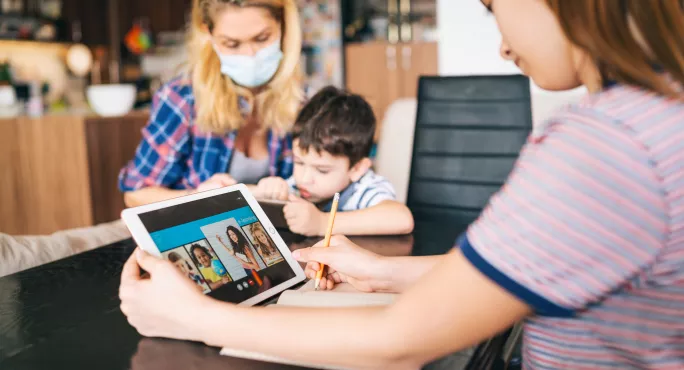Six ways teachers can support home learning

It is no secret that remote learning during a pandemic can be challenging - to say the least - for teachers, pupils and parents alike.
As schools aim to offer good quality distance teaching amid the coronavirus crisis, incorporating everything from live lessons, to video tutorials, virtual worksheets, apps and quizzes, deciding which resources to use might feel overwhelming.
So, to help teachers tailor their efforts towards approaches “most likely to have a positive impact”, the Education Endowment Foundation (EEF) has set out six key principles for supporting home learning, adapted from the “best available evidence”.
Research: Remote learning ‘rivals traditional teaching’
Coronavirus: Free laptops for disadvantaged pupils
Exclusive: National edtech hub ‘needed to close gap’
“At this time, schools are likely to be using a blend of existing, adapted and new approaches for engaging parents in their children’s learning,” the charity said.
“Many of these approaches will already be having a positive impact. However, schools may wish to consider the following principles (adapted from the best available evidence) when considering how to plan, monitor and modify their approaches during school closures.”
- Consider providing activities for children in a range of formats.
Children from low-income families are less likely to have easy access to laptops, tablets or the internet, limiting their ability to participate in digital activities set by teachers. Conversely, some will have access to digital technology but lack physical resources such as pencils, glue sticks, protractors etc. Many schools are already targeting resource pack home deliveries for pupils in need. - Offer parents support that is practical, focusing on clear guidance that they can act on.
Many parents lack confidence in their ability to support their children’s learning and so simple strategies are more likely to be adopted. Small prompts for shared reading or tips for how long to keep your child studying are actionable and don’t require too much specific expertise. - Tailor your focus and strategies for different age groups.
For younger children:
• Promote shared activities such as reading together or playing with letters and numbers.
• Set short and focused learning projects that parents can more easily manage.
• Encourage establishing a positive home learning environment, ensuring that there are resources such as books, puzzles and toys available.
For older children:
• Parental encouragement for, and interest in, older children’s learning is more important than direct involvement.
• Provide general information to parents on child development or curriculum content to create helpful context, while ensuring that the work is linked to specific actions that they can take to support learning.
• Set between one and two hours per school day (slightly longer for older pupils). Effects diminish as the time that students spend on homework increases beyond this point. - Encourage parents to know about the work that is sent home and support their children to do it, rather than getting directly involved in the actual assignments.
This may help avoid conflict at home, while making clear that there is not an expectation for parents to act as teachers. - Build in opportunities for parents to promote the self-regulation in children that is necessary to achieve academic goals.
These could include goal-setting, planning, perseverance, and the management of time, materials, attentiveness and emotions. For example, guiding parents to have a “five-minute plan” chat with children before they get started with home learning can pose helpful reflection. - Suggest some pedagogical principles to support parents.
Some parents may wish to involve themselves more directly in their children’s learning. Where this is the case, schools could look to suggest some pedagogical principles to support parents to do this most effectively, such as scaffolding, or using quizzes and flashcards for retrieval practice.
You need a Tes subscription to read this article
Subscribe now to read this article and get other subscriber-only content:
- Unlimited access to all Tes magazine content
- Exclusive subscriber-only stories
- Award-winning email newsletters
Already a subscriber? Log in
You need a subscription to read this article
Subscribe now to read this article and get other subscriber-only content, including:
- Unlimited access to all Tes magazine content
- Exclusive subscriber-only stories
- Award-winning email newsletters
